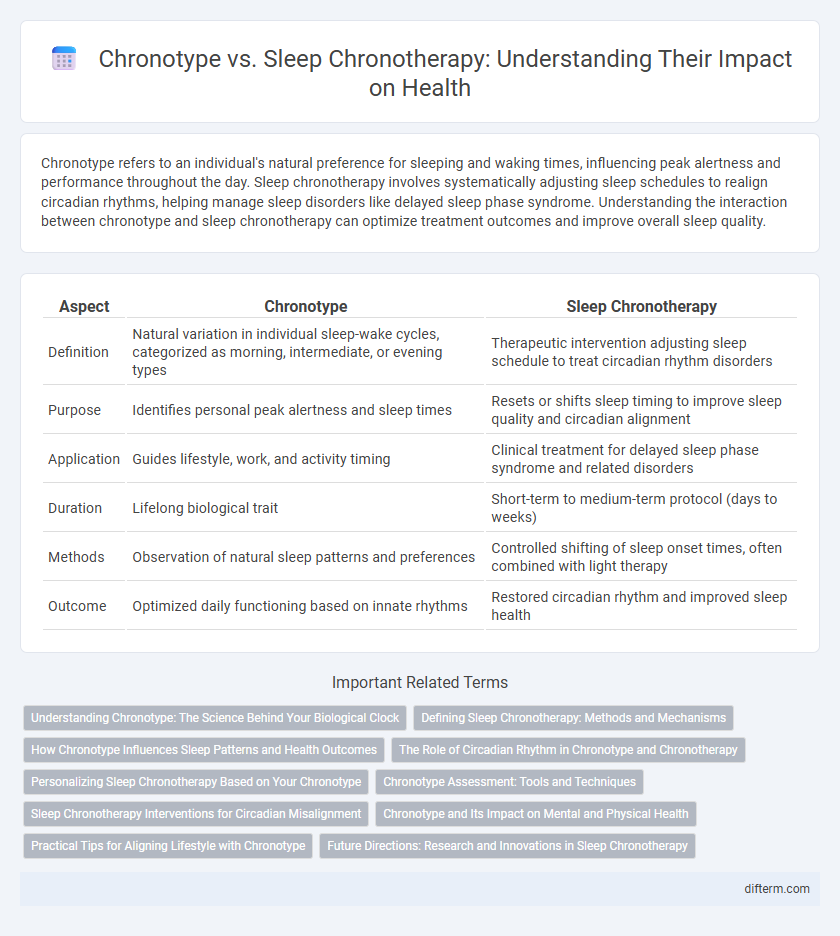Chronotype refers to an individual's natural preference for sleeping and waking times, influencing peak alertness and performance throughout the day. Sleep chronotherapy involves systematically adjusting sleep schedules to realign circadian rhythms, helping manage sleep disorders like delayed sleep phase syndrome. Understanding the interaction between chronotype and sleep chronotherapy can optimize treatment outcomes and improve overall sleep quality.
Table of Comparison
| Aspect | Chronotype | Sleep Chronotherapy |
|---|---|---|
| Definition | Natural variation in individual sleep-wake cycles, categorized as morning, intermediate, or evening types | Therapeutic intervention adjusting sleep schedule to treat circadian rhythm disorders |
| Purpose | Identifies personal peak alertness and sleep times | Resets or shifts sleep timing to improve sleep quality and circadian alignment |
| Application | Guides lifestyle, work, and activity timing | Clinical treatment for delayed sleep phase syndrome and related disorders |
| Duration | Lifelong biological trait | Short-term to medium-term protocol (days to weeks) |
| Methods | Observation of natural sleep patterns and preferences | Controlled shifting of sleep onset times, often combined with light therapy |
| Outcome | Optimized daily functioning based on innate rhythms | Restored circadian rhythm and improved sleep health |
Understanding Chronotype: The Science Behind Your Biological Clock
Chronotype refers to an individual's natural predisposition for sleep-wake timing, governed by the circadian rhythm regulated by the suprachiasmatic nucleus in the hypothalamus. Understanding chronotype involves analyzing genetic, environmental, and behavioral factors that influence peak alertness and sleep propensity throughout the 24-hour cycle. Sleep chronotherapy leverages chronotype insights to adjust sleep schedules systematically, optimizing sleep quality and cognitive performance by aligning with the body's intrinsic biological clock.
Defining Sleep Chronotherapy: Methods and Mechanisms
Sleep chronotherapy involves systematically adjusting sleep-wake times to reset the body's internal clock, targeting circadian rhythm disorders such as delayed sleep phase syndrome. Methods include gradual phase delays or advances in sleep onset times, controlled exposure to bright light, and timed melatonin administration to realign endogenous melatonin secretion with desired sleep periods. These mechanisms optimize circadian entrainment by leveraging the suprachiasmatic nucleus's responsiveness to environmental cues, ultimately improving sleep quality and daytime functioning.
How Chronotype Influences Sleep Patterns and Health Outcomes
Chronotype, an individual's natural sleep-wake preference, significantly influences sleep patterns by determining peak alertness and optimal sleep times. Misalignment between chronotype and social schedules often leads to sleep deprivation, increasing risks for cardiovascular diseases, obesity, and impaired cognitive function. Personalizing sleep chronotherapy according to chronotype can enhance treatment efficacy and improve overall health outcomes by realigning circadian rhythms.
The Role of Circadian Rhythm in Chronotype and Chronotherapy
Circadian rhythm regulates the body's internal clock, directly influencing chronotype, which determines individual sleep-wake preferences such as morningness or eveningness. Chronotherapy utilizes this circadian alignment by adjusting sleep schedules to treat sleep disorders, optimizing treatment efficacy based on a person's biological timing. Understanding circadian rhythmicity enhances personalized interventions, promoting better sleep quality and overall health outcomes.
Personalizing Sleep Chronotherapy Based on Your Chronotype
Personalizing sleep chronotherapy based on your chronotype enhances treatment effectiveness by aligning therapy schedules with your natural circadian rhythms. Understanding whether you are a morning lark or night owl allows clinicians to tailor light exposure, melatonin administration, and behavioral interventions to optimize sleep quality and daytime alertness. Research shows that synchronizing sleep chronotherapy to individual chronotypes improves outcomes in circadian rhythm disorders and overall health.
Chronotype Assessment: Tools and Techniques
Chronotype assessment utilizes validated tools such as the Morningness-Eveningness Questionnaire (MEQ) and the Munich Chronotype Questionnaire (MCTQ) to determine individual circadian preferences. Wearable devices and actigraphy provide objective data on sleep-wake patterns, enhancing the precision of chronotype identification. Accurate chronotype evaluation informs personalized sleep chronotherapy, optimizing treatment outcomes for circadian rhythm disorders.
Sleep Chronotherapy Interventions for Circadian Misalignment
Sleep chronotherapy interventions target circadian misalignment by gradually adjusting sleep-wake schedules to restore natural biological rhythms. These interventions use controlled light exposure, melatonin administration, and scheduled sleep periods to realign the circadian clock with environmental cues. Scientific studies demonstrate that sleep chronotherapy effectively reduces symptoms in conditions like delayed sleep phase disorder, shift work disorder, and jet lag.
Chronotype and Its Impact on Mental and Physical Health
Chronotype refers to an individual's natural preference for sleep and activity times, significantly influencing mental and physical health outcomes. Disruptions to one's chronotype, such as misalignment with societal schedules, increase risks of mood disorders, cognitive decline, and metabolic problems. Understanding chronotype helps tailor sleep chronotherapy to improve circadian rhythm alignment, enhancing overall well-being and reducing chronic health conditions.
Practical Tips for Aligning Lifestyle with Chronotype
Aligning your lifestyle with your natural chronotype enhances sleep quality and overall health by scheduling activities according to your peak energy times. Morning types should prioritize early exercise and exposure to natural light, while evening types benefit from a gradual wind-down routine and limiting screen time before bed. Incorporating consistent sleep-wake schedules and strategic meal timing supports the effectiveness of sleep chronotherapy for circadian rhythm adjustments.
Future Directions: Research and Innovations in Sleep Chronotherapy
Emerging research in sleep chronotherapy highlights the integration of personalized chronotype assessments with adaptive treatment protocols to enhance therapeutic outcomes for circadian rhythm disorders. Innovations such as wearable technology and artificial intelligence enable real-time monitoring and tailored interventions, optimizing sleep phase adjustments and improving overall sleep quality. Future directions prioritize multi-omics approaches and gene-environment interaction studies to refine chronotherapy precision and support individualized patient care.
Chronotype vs Sleep Chronotherapy Infographic

 difterm.com
difterm.com